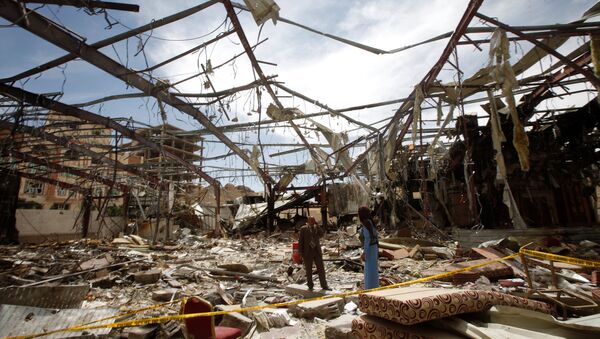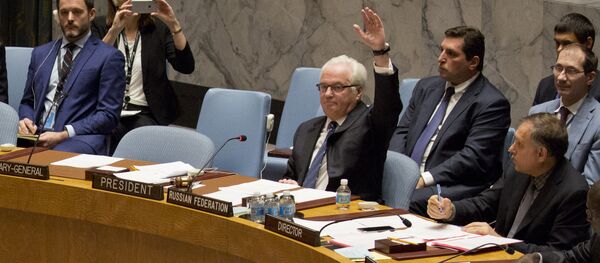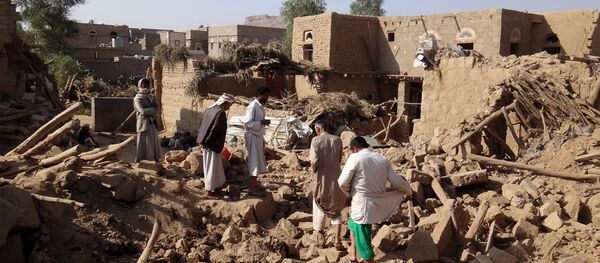Under the cover of a multi-national military operation, the Saudi-led coalition has repeatedly violated international law in Yemen, Maryam Jalalvand, a law expert at Payame Noor University (PNU), Iran, told Sputnik Persian.
Jalalvand argues that some of the coalition's actions in Yemen could be defined as "war crimes."
"Bahrain, Qatar, Kuwait, the United Arab Emirates, Morocco, Sudan, Jordan and Egypt are the countries which carried out attacks on Yemen under the guidance of Saudi Arabia. During the airstrikes civilian targets had been attacked and more than 3,500 were killed," Jalalvand pointed out.
Indeed, in March 2015 the Saudi-led coalition stopped a Red Cross plane from delivering medical supplies in Sanaa, Reuters reported, citing ICRC (the International Committee of the Red Cross) spokeswoman Sitara Jabeen.
In November 2015 the ICRC expressed its growing concerns regarding "the continuing attacks on health care facilities in Yemen" by the coalition forces.
"Deliberate attacks on health facilities represent a flagrant violation of international humanitarian law (IHL)," the ICRC official website warned.
"The war crimes committed by the coalition in Yemen also include the killing of civilians (children and women), bombing of grain stockpiles, preventing the delivery of medical supplies and doctors, attacks on civilian facilities, for instance the assault against the Sanaa electric power station and the attack on the only power plant in Sadah province, as well as the use of prohibited weapons (phosphorus and American cluster bombs) against Yemeni civilians," Jalalvand told Sputnik Persian.
On the other hand, Jalalvand called attention to the anti-Shiite sentiment among the Saudis. Yemen's population is split between two major branches of Islam, Sunni and Shiite. Zaidi Shiites amount to 40 percent of Yemeni Muslims.
The law expert said that the actions of the Saudi military forces in Yemen are covered by Article 8 of Rome Statute of the International Criminal Court.
"For the purpose of this Statute, 'war crimes' means: Grave breaches of the Geneva Conventions of 12 August 1949… and other serious violations of the laws and customs applicable in international armed conflict," the Statute reads.
In this context, Jalalvand pointed out, the coalition's air strikes against the country's civilian population, objects of civilian infrastructure, buildings dedicated to religion, education, art, science purposes, historic monuments, hospitals, airports and schools de facto constitute war crimes.
In her September interview with Sputnik Bierre underscored that the Saudi-led coalition is not only targeting Yemeni civilians, including elderly people, women and children, but is also wiping out their cultural memory by systematically destroying the rich cultural and historical legacy of Yemen.
She pointed out that in June 2016 the French scientific community organized a colloquium at the Bourbon Palace, bringing together the world's leading specialists in the historical heritage of Yemen.
The expert raised the alarm about the fact that the coalition is targeting millennium-old buildings of no military interest, including three UNESCO sites.
Jalalvand believes that there is a way out from the Yemeni crisis.
According to the Iranian law expert, Yemeni authorities could send an official request to the International Criminal Court to start an investigation into the coalition's actions. However, the situation is complicated by the political instability of the country.
The other path is to appeal to the United Nations Security Council which can initiate an investigation in the International Criminal Court. However, to start such investigation the UN Security Council needs to recognize what is going on in Yemen as a situation that is dangerous for peace and stability, Jalalvand concluded.




